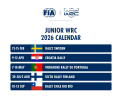Updates to 2026 FIA WRC Sporting Regulations approved by the World Motor Sport Council
- Mandatory rest hours introduced across all FIA World Rally Championship events.
- New criteria and procedures for Candidate Rallies introduced.
- Engine replacement rules revised for 2026.

Following an e-vote by the World Motor Sport Council, a series of updates to the regulations governing the FIA World Rally Championship have been approved. The revisions introduce new provisions relating to mandatory rest hours, establish a formal framework for Candidate Rallies seeking inclusion in the FIA WRC calendar, amend the duration of midday service and update the regulations governing engine replacement. Further changes refine the application of chicanes, maximum lateness procedures and other operational and sporting elements across events.
These changes will form part of the 2026 FIA WRC Sporting Regulations, governing the top level of closed-road competition for the 2026 season.
The following is a summary of the new regulations approved by the World Motor Sport Council.
Mandatory rest hours introduced
Following feedback from teams and competitors regarding extended rally competition hours during recent seasons, a new regulation has been introduced defining minimum rest periods at FIA World Rally Championship events.
The regulation establishes formal definitions of competition and rest hours across each rally. Setting minimum thresholds for overnight recovery periods, requiring total rest hours across the rally to be at least equal to the total competition hours, with the exception of the opening day of the competition, while daily rest periods may not fall below ten hours, including at least one day providing a minimum of twelve hours of recovery time.
These measures are intended to ensure greater consistency across events and provide increased rest time for crews, teams, officials and volunteers.
Candidate rallies
A new framework concerning Candidate Rallies has been approved by the World Motor Sport Council, providing a simplified framework for events seeking inclusion in the FIA World Rally Championship calendar. The new guidance sets out the process for requesting Candidate Rally status, establishing the responsibilities of the FIA, WRC Promoter, ASNs and Event Organisers.
Under the new framework, once WRC Promoter notifies the FIA of an Event Promotion Agreement with a proposed Event Organiser, the relevant ASN may request a Candidate Rally inspection. The FIA Road Sport and Safety Departments will then work with the event to ensure preparation consistent with WRC safety, sporting and medical requirements.
The new framework also introduces specific conditions for Candidate Rallies, including timelines for evaluation. Events must be held in the year prior to the proposed inclusion and no later than nine months before the scheduled date of the planned WRC round. Candidate Rallies should, where possible, be based on an existing national or regional championship event. Key officials, including the Clerk of the Course, Chief Safety Officer and Chief Medical Officer, must be the same individuals intended to officiate at the proposed WRC event.
The framework also formalises the areas assessed by the FIA before and during a Candidate Rally, covering sporting, safety and medical documentation, special stages, key facilities such as the service park and rally headquarters, and medical and rescue resources. Following each Candidate Rally, reports will be issued to guide the ASN and Event Organisers on required actions ahead of potential inclusion in the FIA WRC.
The objective of the framework is to standardise Candidate Rally procedures, ensure events accurately reflect WRC operational standards, and provide clearer guidance to ASNs and Event Organisers during the application process.
Chicanes
New articles have been introduced to define the use of chicanes in special stages and clarify the procedures for their implementation. The articles specify that chicanes may be established to address safety considerations and must be documented in the Safety Dossier and road book, with full signage and positioning in place prior to reconnaissance.
A time penalty of five seconds per element will apply when a chicane element is completely displaced from its marked position, with any such penalties issued by the Clerk of the Course, while any further infringements may be referred to the Stewards. These measures aim to provide clearer guidance to event officials and ensure consistent application of chicanes across WRC events.
Engine replacement
The World Motor Sport Council has approved an amendment clarifying the circumstances in which competitors may replace an engine during a rally. Competitors suffering engine failure after the start of the competition may replace their engine, with the exception of Rally1 cars nominated to score Manufacturers’ points.
The amendment also sets a 60-minute time penalty for any engine change made after the start of the competition element of the rally and bars any competitor who has changed their engine from scoring points in any of the FIA championships or cups at that event.
The amendment is intended to allow competitors to continue participating in the rally in the event of a major mechanical issue while remaining outside of the competitive classification due to the associated penalty and ineligibility for points.
Updates to Service Park Schedules
Changes to the length of midday service have also been approved, reducing the service duration from 40 minutes to 30 minutes, returning the midday service period to the standard applied prior to the introduction of hybrid units.
Maximum lateness
A new provision has been introduced to set a limit on how late a crew may start a special stage. For safety reasons, any crew arriving more than ten minutes after the last competing car may be directed to bypass the stage and rejoin the route via the alternative road section. In such cases, the crew will be assigned a notional time for the stage. The change aims to formalise limits on late starts and ensure consistent procedures when crews fall significantly behind schedule.
Shakedown requirements
Changes to the rules governing shakedown were also introduced, with the amendment limiting P2, P3, P4 and non-priority drivers to a maximum of two passages of the shakedown stage.

 Facebook
Facebook Twitter
Twitter






